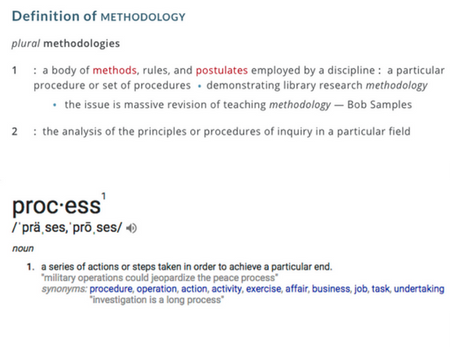Whether you are a sales person in a company or a founder of a small company- you have a sales process already. Whether it is effective, scalable, and most importantly- designed around your ideal customer’s buying process is a whole other story.
Several CEOs and founders of small companies and startups have asked me for help with their sales process over the past few weeks. One specifically asked “...we are at the point of wanting to grow our team but we don't have a solid method of keeping sales stable. We have hired numerous sales people before that did bring in sales but we weren't seeing the return so we eventually let them go.”
One thing that I learned early in my career was the importance of a documented process for continuous improvement. The first time I ‘designed a sales process’ from scratch, it was an intense effort that earned me a lot of gray hairs from the experience.The most important lesson I learned is that no matter how good the process and plan, it is the ability of the team to implement the plan and execute on the process that leads to results. Without a solid methodology and development of the team, that will probably never really happen.
That experience and others like it is what has led me to believe that while sales process is critical to growth, it must be designed around the ideal buyer and with the input from front line sales people and leaders. Because their input is required, the development of sales leadership and sales people must happen also happen. Lest the shortcomings and weaknesses of leadership become the collateral damage of the team, and ultimately- your ideal buyers. Which comes first, the methodology or the process? You can’t answer which comes first, the chicken or the egg, because they are happening at the same time.
So what is the difference between a sales methodology and a sales process?
 Using the above definitions, think of your sales process as the steps of activities that lead to a prospect becoming a customer. Your sales methodology is how you take those steps- your approach, your style, how you ask questions.
Using the above definitions, think of your sales process as the steps of activities that lead to a prospect becoming a customer. Your sales methodology is how you take those steps- your approach, your style, how you ask questions.
Download the Roadmap to Unbound Growth to discover the methodology we use to help sales people and companies align process and methodology.
How to design a sales process in the context of sales development and coaching.
- Observe
This is where input from front line sales is needed. If you are the owner who also sells, this should be easy. Just journal what happens. Ask buyers, what process do you use to buy this type of solution? - Map
Now take what you have journaled and organized it into stages, or cycles. - Identify Buyer Actions
What are your buyers doing in these stages? - Update regularly
Just as you started documenting your process, repeat the process. (how often will depend on the length of your sales cycle.)
Download the layered questions sales process for a framework that you can edit and use to start documenting your sales process.
Bottom line, your sales process should be able to tell you 3 things:
1- Stages of the process and activities needed at each stage to get a new customer.
2- Clear understanding of the buyer actions at each stage that verifies the stage in the process.
3- Requirements needed from both buyer and seller on how to get to the next stage.
Will they do what they know they should? And how well?
I am working with a team in a SaaS company who has an extremely well documented sales process. The manager recently commented that he was concerned that the team wasn’t qualifying opportunities well enough. It was too easy for him to poke holes in what they thought was happening.
A sales process that has been designed around the buyer makes it easier for sales people to disqualify people who are not a good fit. Those that won’t be successful with your solution are easily spotted.
But as this manager is learning, if your team doesn’t execute on the process as intended- it doesn’t happen. If their selling methodology doesn’t align with the process then they may end up with a lot of opportunities that aren’t real, will never close, or will require steep discounts. Pipelines become even more unpredictable, processes become unscalable, and employee and customer churn will never decrease.
Is your reason for slow or lack of sales growth due to a poor sales process or methodology? How do you know which it is when both are happening at the same time?






